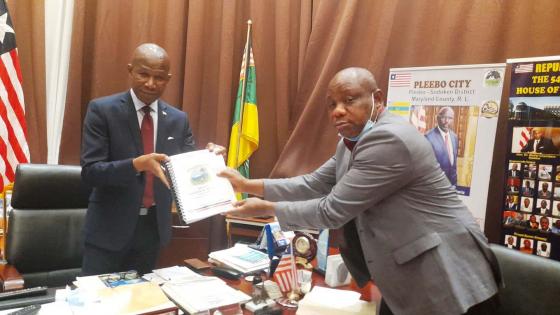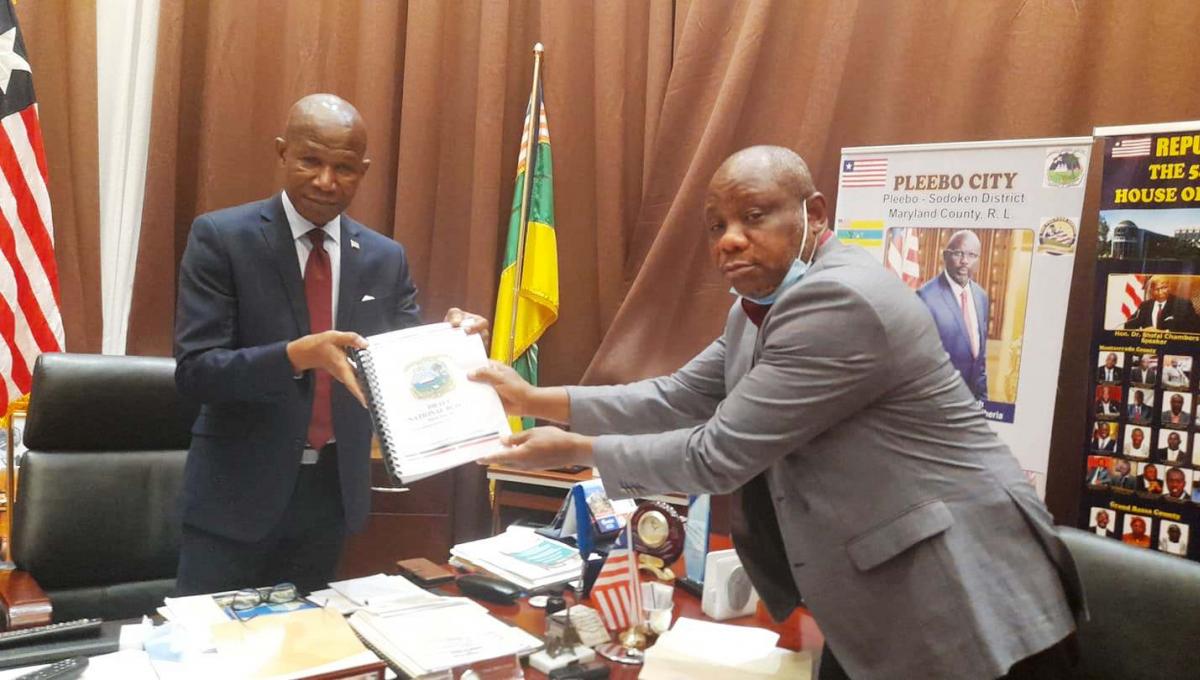Liberia: 2022 Budget Lacks ‘Transparency’

Flashback: Finance Minister Samuel D. Tweah, Jr (right) presents the draft National Budget to House Speaker Dr. Bhofal Chambers.
-- CSOs Reveal
Three Civil Society Organizations (CSOs) have startlingly disclosed that the FY2022 budget, submitted to National Legislature for scrutiny in the amount of US$785.5 million lacked transparency because most of the “proposed investments” in the budget gave rise to “suspect, speculation, and blank cheque”.
The fiscal year 2022 budget, which the Minister of Finance and Development Planning, Samuel D. Tweah, Jr, submitted on behalf of the President carries an envelope of US$785,587,340.00. Out of this budget envelope, domestic revenue is projected at US$640,587,340 and US$145,000,000 from external resource projection.
Three CSOs, namely Integrity Watch Liberia (IW-L), Foundation for Community Initiative, and the CSO Budget Platform, in a press conference, shed light on the analysis of the Executive Budget Proposals with a focus on select budgetary proposals both in recurrent expenditure and capital investments which highlighted potential risks that grossly undermine transparency and accountability.
According to the CSOs, though the US$10 million dollars (investment expenditure) proposed to implement promises made by the President during his nationwide tour of counties, is welcoming, it is however not disaggregated by sector, project, or unit cost per project; and there is no indication of the specific locations where the projects will be implemented.
“By this presentation, it only leaves the public to suspect, speculate and wonder what role did the Office of the President or the Ministry of State for Presidential Affairs play during the budget preparation process, as there was sufficient time to have provided such vital information well in advance,” the CSOs argued.
The CSOs furthered that the US$46 million proposed for the construction of new roads, the continuation of ongoing road works, maintenance of existing roads and bridges, as well as the repayment and resettlement of property owners affected roadworks ǐs vulnerable to corruption.
“There is no information provided, which are considered ‘core elements’ in any of the budget documentation, number of kilometers of roads, the locations of the roads to be affected, expected beneficiaries, and economic returns. Also, it leaves the public to suspect, speculate and wonder where was the Ministry of Public Works or what role did they play during the budget preparation process for which such vital and basic core elements requiring a project could be missing from the budget documentation?” the CSOs pondered.
The CSOs furthered that the US$10 million for vaccine administration in the draft budget lacked transparency. “The Ministry of Health (MoH) should have provided summary information as opposed to a targeted number of vaccines to be procured, type of vaccines, plans for achieving the global target of herd immunity, etc."
What this means, in essence, is that the government is giving a ‘blank cheque’ to the Ministry of Health.” On Education, the CSOs disclosed a total of US$4 million of additional funds to provide basic services but are not properly aligned (no core information was given) and are therefore left with the interpretation by the Ministry of Education.
“Additionally, there is US$2 million for primary education, US$1 million for classroom furniture, US$1 million for closing the teachers’ gap, approximately 0.5 million for robust school supervision and monitoring by all 124 school districts, with all these budget lines there is no core information which clearly speaks to the lack of transparency in the budget,” the CSOs opined.
The rise of Interest in Budget-Related Transparency and Accountability Initiatives confluence several factors. These include pressures from 'above'–most notably the tax and budget policy advocacy organization, the BP collaborates with civil society groups International Monetary Fund (IMF) –as well as from ‘below’, as the number of civil society
The trend toward greater openness in public budget processes has resulted from the actor to promote engagement with public budgets in the International Budget Partnership governance and reduce poverty. Participants in civil society budget work have grown from a (IBP).
Meanwhile, in light of these concerns in improving Transparency and Accountability in the Budget Process, Integrity Watch Liberia (IW-L), Foundation for Community Initiative, and the CSO Budget Platform make the following recommendations to the Legislature for consideration for the FY2022 budget.
“We recommend that the National Legislature ensure the Executive produces a detailed list of disaggregated county tour projects by sector and individual cost estimates before the passage of the budget and that such list should form an integral part of the legislative instrument to the enacted budget, and that the Ministry of Health furnishes the Legislature with a detailed plan of its vaccine administration – i.e. type of vaccines, the number of vaccines, etc," the CSO said.
They added that "Similarly, we recommend for the Legislature to request the Ministry of Education to provide comprehensive disaggregated data of core information of its budget to improve transparency and value for money. We recommend sustained investments in education, health, and security spending for effective and efficient delivery of basic services to the citizens.”
The CSOs said the adoption and implementation of robust monitoring and evaluation mechanisms of public spending by the Executive and the institution of strong legislative oversight on the Executive to ensure value for money, and the promotion of transparency and accountability as well as deliberate and concerted actions by the government to crack down on the production, sales and distribution drug abuse, narcotics and harmful substances which are impacting on the youth. Drastic changes need to be made in legislation, public policy, and budgetary allocation to adequately address these public menaces.
“We wish to remind the government that these are all benchmarks of the Millennium Challenge Corporation (MCC) that the government needs to improve,” the CSOs noted.


